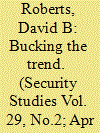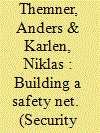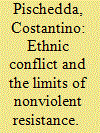|
|
|
Sort Order |
|
|
|
Items / Page
|
|
|
|
|
|
|
| Srl | Item |
| 1 |
ID:
171986


|
|
|
|
|
| Summary/Abstract |
The literature examining national militaries in the Arab world paints a near-universally bleak picture of their capabilities. Some argue issues rooted in “Arab culture”—so-called essentialist rationales—fatally undermine military effectiveness. Others assert that regime security concerns encourage leaders to actively politicize, coup-proof, and consequently weaken their military. This article challenges these literatures by demonstrating that United Arab Emirates (UAE) forces have repeatedly exemplified unusual levels of military effectiveness and sophistication in hostile campaigns. Using approaches from public policy studies (the Advocacy Coalition Framework), this paper investigates how the UAE military bucked the trend. The 1990 invasion of Kuwait was a “focusing event” that prompted a rethink of existing approaches. Catalyzed, a key “policy entrepreneur,” Abu Dhabi Crown Prince Mohammed bin Zayed Al-Nahyan, changed approaches to training, unified federal militaries, and tested forces in challenging operations. Such findings undercut lingering essentialist critiques of Arab militaries, provide a potential pathway for other states to emulate, demonstrate that secure and motivated leaders can overcome coup-proofing concerns, and showcase the fruitful pollination of methodologies from public policy to security studies.
|
|
|
|
|
|
|
|
|
|
|
|
|
|
|
|
| 2 |
ID:
171985


|
|
|
|
|
| Summary/Abstract |
The disarmament, demobilization, and reintegration of ex-combatants has become an integral part of peacebuilding. Although the main purpose of such interventions is to dissolve the military structures of armed groups, there is growing evidence that ex-combatant networks often remain intact. We investigate why such structures continue to thrive. We argue that ex-military networks are stronger when ex-commanders have weak links to elite patronage systems. Ex-combatants who are unable to rely on their former superiors for economic assistance must instead build denser ties to each other to gain access to a social safety net. To assess our argument, we conduct a comparative social network analysis (SNA) of two ex-military networks in Liberia. This innovative approach helps us uncover previously overlooked, but central, dynamics related to ex-combatant groups. We thereby show that SNA provides a range of underutilized tools and exact definitions that can increase our understanding of ex-military networks.
|
|
|
|
|
|
|
|
|
|
|
|
|
|
|
|
| 3 |
ID:
171987


|
|
|
|
|
| Summary/Abstract |
In theory, a fully functional quantum computer could break the cryptographic protocols that underwrite cybersecurity everywhere, which would be disastrous for national security, global trade, and civil society. Quantum cryptography, conversely, promises an unprecedented level of security, yet this benefit comes with some danger: revisionist actors with impenetrable communications might be able to conduct surprise attacks and covert conspiracies. In reality, neither of these threat scenarios are likely. Intelligence advantage in political competition depends on the interaction of technological infrastructure with organizational institutions. Robust cryptosystems can be undermined by poor organizational coordination, and careful security policy can compensate for technical vulnerabilities. Scientific innovation in quantum technology only affects one of these dimensions while potentially complicating the other. Even if the formidable engineering challenges of quantum computing can be overcome, signals intelligence collectors will still have to analyze a vast number of decrypts and deliver timely and relevant judgments to interested decision makers. The quantum networks of tomorrow, similarly, will provide little protection for complex organizations that have weak operations security practices. In the practice of intelligence, we should expect classical politics to dominate quantum computing.
|
|
|
|
|
|
|
|
|
|
|
|
|
|
|
|
| 4 |
ID:
171988


|
|
|
|
|
| Summary/Abstract |
Recent research shows that campaigns of nonviolent resistance are much more successful in producing radical political change than armed rebellion. I argue that the study of nonviolent resistance has paid insufficient attention to a key condition for success—a shared ethnic identity between challengers and government. When challengers and incumbent belong to different ethnic groups, the prospects of campaign success are drastically curtailed, as this situation of “ethnic conflict” inhibits the mechanisms through which nonviolent resistance enables success: emergence of a critical mass of challengers, defection of segments of the security apparatus and the regime inner circle, and development of feelings of sympathy for the opposition cause among key government decision makers. Statistical analysis of all nonviolent campaigns from 1945 to 2006 supports my argument. Nonviolent ethnic campaigns are significantly and substantially less likely to succeed and draw both fewer participants and government defectors than their nonethnic counterparts.
|
|
|
|
|
|
|
|
|
|
|
|
|
|
|
|
| 5 |
ID:
171984


|
|
|
|
|
| Summary/Abstract |
How economic sanctions are enforced undoubtedly affects their chances of success. Yet, to date, a lot remains unknown about how governments actually enforce their sanctions. To shed light on the ways governments enforce their sanctions, we conduct an empirically driven case study of how the lead agency for enforcing economic sanctions in the United States, the Treasury Department’s Office of Foreign Assets Control (OFAC), has enforced US sanctions from 2003 to 2018. Our study begins with an empirical exploration of how OFAC’s enforcement actions originate, what factors correlate with enforcement actions being taken, and what factors contribute to the financial penalties imposed as part of enforcement actions. We find that OFAC engaged in two distinct enforcement strategies during our period of analysis: a “fishing” strategy that involved taking a lot of enforcement actions and imposing small fines during the administration of George W. Bush and a “whale-hunting” strategy that involved pursuing fewer cases but imposing enormous fines during Barack Obama’s administration. Our analysis indicates that the shift in foreign policy emphasis from Cuba to Iran during the Bush administration and how that motivated new legislation to enhance penalties for violating sanctions paved the way for the OFAC to adopt its innovative whale-hunting strategy during the Obama administration. Our study also yields a wealth of new empirical insights into how the United States enforces its sanctions that can contribute to future theory-building efforts.
|
|
|
|
|
|
|
|
|
|
|
|
|
|
|
|
| 6 |
ID:
171983


|
|
|
|
|
| Summary/Abstract |
What factors influence whether allies have the same understandings of threats and adversaries? Allies may infer they share each other's views without verifying if this is so, with harmful consequences. A set of psychological biases can cause policymakers to neglect valuable information held by one or more allies, and instead disproportionately discuss information that every allied contributor to a threat assessment already knows. Psychologists call the unshared assessments “hidden profiles”: an evaluative profile that postulates key features of a problem or threat, hidden in the sense that it is unintentionally withheld from the wider group. This manuscript compares the hidden-profiles model and alternative theories of threat perception using the 1956 Suez Crisis as a case study
|
|
|
|
|
|
|
|
|
|
|
|
|
|
|
|
|
|
|
|
|